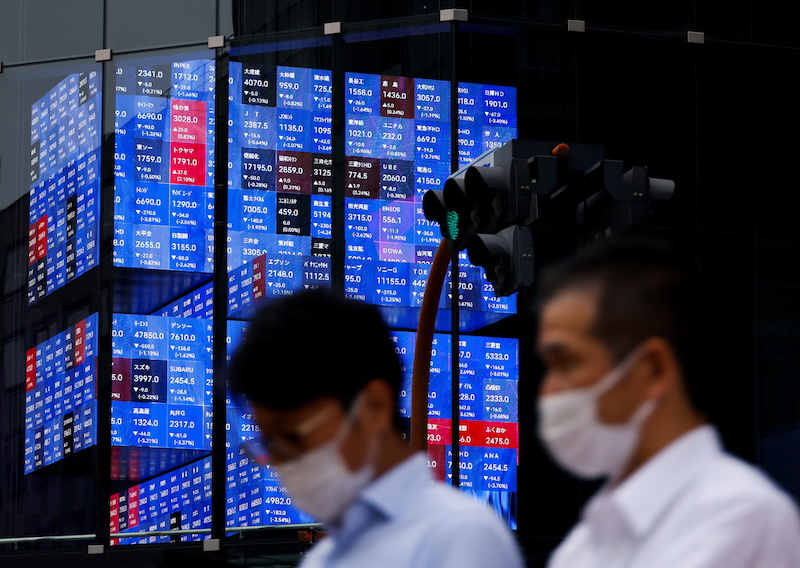Asian stocks struggled on Monday with gains few and far between as fears of global recession and central bank tightening continued to weigh on sentiment.
Japan’s Nikkei index ended at a more than five-week low, with chip-related and energy stocks leading the losses, while investors struggled to find market moving cues due to a US holiday.
The Nikkei share average fell 0.74% to 25,771.22, its lowest closing level since May 12, after gaining as much as 0.7% in early trade. The broader Topix slipped 0.92% to end at 1,818.94.
Technology and growth stocks dragged the market down on concerns about rising interest rates overseas. Chip-making equipment maker Tokyo Electron fell 5.2% and Silicon wafer maker Shin-Etsu Chemical slipped 6.39%.
Also on AF: Asia’s ‘Mightiest Warship’ Shows China Closing on Rival US
China stocks closed up though as its banks kept their lending benchmarks unchanged, with real estate developers leading the gains as property sales recovered after supportive measures buoyed demand.
There was also the boost from news US President Joe Biden’s administration was reviewing the removal of some tariffs on Chinese firms and goods.
Nomura said property sales across 30 cities recovered quickly last week, with four top tier cities recording 20%-30% volumes higher than a year ago, and second-tier cities 30% on average.
China’s CSI300 Real Estate Index gained 3.1%, while the Hang Seng Mainland Properties Index jumped 6.5%.
Meanwhile, the blue-chip CSI300 index rose 0.5% to 4,330.43, while the Shanghai Composite Index was almost unchanged at 3,315.43 points.
The Hang Seng index rose 0.4% to 21,163.91, while the China Enterprises Index gained 0.4% to 7,399.60 points.
Tech giants listed in Hong Kong edged up 0.1%, while NetEase slumped 6.7% as the company delayed the rollout of its video game Diablo Immortal in China three days ahead of its official launch.
Gambling stocks lost 2.3% as the world’s biggest gambling hub Macau began its second day of mass Covid-19 testing on Monday, with banks, schools, government services and other businesses shut, but casinos remaining open.
South Korea Stocks Slump
Elsewhere across the region, South Korea’s benchmark led losses with a 2% slump, hitting its lowest levels since November 2020 during the session.
Shares in Kuala Lumpur fell 1.1%, touching their lowest levels in two years, as a near 7% drop in Malaysian palm oil futures weighed on the market.
Taiwan stocks dipped 1.8%, Thailand slipped 0.3%, while Jakarta reversed course to climb 0.3%.
Indian stocks advanced with Mumbai’s signature Nifty 50 index up 0.22%, or 33.00 points, at 15,326.50.
“The market seems to be alternately calmed by commentary that the Fed will do whatever it takes to get inflation down, and panicking about what that might mean. So, this looks as if it will be another week with large swings in both directions,” ING analyst Robert Carnell said in a note.
Nomura’s ‘Mild Recession’ Warning
Globally, stock markets chalked up modest gains after last week’s hefty losses as investors braced for a host of US Federal Reserve speakers this week, where they could underline a commitment to fight inflation whatever rate pain required.
Trading was thinned by a US holiday and investors predicted another choppy session. Nasdaq futures climbed 0.68%, building on Friday’s gains while S&P 500 futures rallied 0.5%.
The S&P 500 fell by almost 6% last week to trade 24% below its January high. Analysts at BofA noted this was the 20th bear market in the past 140 years and the average peak to trough bear decline was 37.3%.
“With rapidly slowing growth momentum and a Fed committed to restoring price stability, we believe a mild recession starting in Q4 is now more likely than not,” analysts at Nomura warned.
“Financial conditions are likely to tighten further, consumers are experiencing a significant negative sentiment shock, energy and food supply disruptions have worsened and the outlook for foreign growth has deteriorated.”
Bitcoin slipped 1% to $20,438, having bounced sharply over the weekend amid talk of a single large buyer.
Oil prices edged lower again after a sharp retreat late last week amid concerns a global recession would curb demand. Brent 0.7% to $112.29, while U.S. crude lost 0.5% to $109.03 per barrel.
Key figures
Tokyo – Nikkei 225 < DOWN 0.74% at 25,771.22 (close)
Hong Kong – Hang Seng Index > UP 0.42% at 21,163.91 (close)
Shanghai – Composite < DOWN 0.04% at 3,315.43 (close)
New York – Dow < DOWN 0.13% at 29,888.78 (Friday close)
- Reuters with additional editing by Sean O’Meara
























